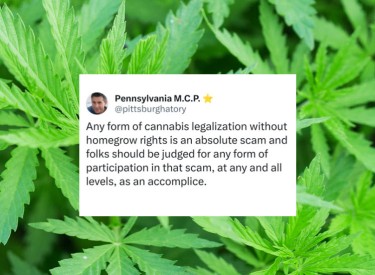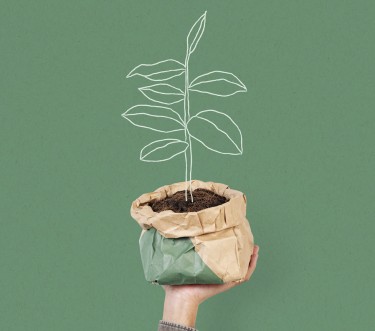
If you can’t grow, it’s not legal!
https://www.reddit.com/r/trees/comments/1b6gsjm/without_homegrow_rights_legalization_is_a_scam/
When it comes to cannabis legalization, personal freedom and autonomy sits at the heart of the movement with the conversation often pivotiting around the principle of “my body, my choice.”
This axiom, a battle cry for sovereign dominion over one’s own physical and psychological domain, underpins the very essence of the legalization movement. Yet, as we navigate the complex and often convoluted paths towards a society where cannabis is not only accepted but integrated into the legal fabric, a crucial component of this autonomy is frequently overlooked or, worse, deliberately omitted: the right to home cultivation.
The notion that any form of cannabis legalization without the inclusion of home grow rights constitutes a scam is not just a radical opinion but a reflection of a deeper understanding of what it means to be truly free.
At its core, cannabis legalization is about dismantling the archaic and punitive structures that have long governed our relationship with this plant. It’s about reclaiming a piece of autonomy that has been systematically denied by decades of prohibitionist policies. Anything less than the full empowerment of individuals to cultivate their own cannabis is a half-measure that leaves the door ajar for governmental overreach and control.
However, while the absence of home grow rights in legalization frameworks is a glaring omission that undermines the principle of bodily autonomy, the notion of judging individuals for their participation in the existing legal cannabis market is a counterproductive stance.
To vilify those who, for various reasons, partake in the legal purchase of cannabis, is to miss the broader point of the legalization movement. It’s not about creating divisions among those who advocate for cannabis freedom but about recognizing the diversity of circumstances and choices within our community.
To argue for home grow rights is to advocate for the very essence of “my body, my choice” within the context of cannabis legalization. It is an assertion that true freedom comes not only from the ability to consume cannabis without fear of legal reprisal but from the unalienable right to cultivate one’s own source of healing, recreation, and spiritual exploration.
This right is the cornerstone of any genuine attempt at cannabis legalization, signifying a move towards complete sovereignty over one’s body and mind. Anything less than this is not just an oversight; it’s a deliberate act of control masquerading as liberation, leaving individuals at the mercy of governmental and corporate interests that have no place dictating the terms of our relationship with this plant.
The inherent right to cultivate our own sustenance, whether for nourishment or medicinal purposes, forms an essential pillar of human autonomy and freedom. This principle extends beyond the simple act of gardening to encompass a broader assertion of our sovereignty over the natural world and our place within it.
The notion that certain plants, including cannabis, can be deemed illegal by governmental entities is not just paradoxical—it’s an affront to the fundamental freedoms of every earthling. This ludicrous stance equates to an assertion of ownership over nature itself, suggesting that the government has the authority to regulate the very essence of the earth’s bounty, as absurd as claiming dominion over the air we breathe or the sunlight that graces our skin.
Criminalizing nature represents more than just a peculiar policy misstep; it signifies a profound attack on the sovereignty of every living human being.
Such policies don’t just deny access to a plant but undermine our very right to self-determination, to choose how we heal, nourish, and enrich our lives. By excluding home-growing rights from cannabis legalization efforts, governments perpetuate a form of criminalization that directly impinges on our right to medicine, to life, and to the pursuit of happiness.
The exclusion of home cultivation rights from cannabis legalization frameworks essentially continues the legacy of prohibition under a different guise. It suggests a continuation of the state’s interference in personal choices and the private use of a plant that has been a part of human culture for millennia.
This interference isn’t just about cannabis; it’s indicative of a larger issue where governmental bodies assume the right to dictate the boundaries of personal freedom and autonomy. The legalization of cannabis, if it is to be meaningful and just, must inherently include the right to grow this plant in the privacy of one’s own home.
Without this provision, legalization becomes a hollow gesture that fails to address the core issues at the heart of cannabis prohibition: autonomy, freedom, and the right to self-determination.
Home cultivation of cannabis stands as a testament to the principle of “my body, my choice,” a mantra that should guide our approach to cannabis policy and beyond. It’s about recognizing that, as sovereign individuals, we have the inherent right to make decisions regarding our health and well-being without undue interference from the state.
It’s about acknowledging the absurdity of criminalizing nature and the importance of reclaiming our autonomy over our bodies and minds.
Therefore, true cannabis legalization must encompass the right to home cultivation.
It’s a matter of principle, a declaration that we, as individuals, have the sovereignty to engage with the natural world in a manner that respects our autonomy and freedom. Anything less is not genuine legalization but a perpetuation of the same oppressive principles that have governed cannabis policy for decades. In championing the right to home grow, we advocate for a more just, equitable, and free society where individuals are truly sovereign over their own lives.
Creating a unified front in the battle for cannabis legalization requires a nuanced understanding of the complex landscape we navigate.
The quote suggesting that those who partake in cannabis from dispensaries in states without home cultivation rights are “complicit in prohibition” presents a dichotomous view that simplifies a multifaceted issue. While it is true that participation within these frameworks does, on a fundamental level, endorse the existing model, the reality of human needs and societal pressures complicate this perspective.
The realm of cannabis legalization is mired in grey areas, where individuals’ needs for medical relief, mental wellness, and leisure intersect with legislative progress and societal norms. To categorically judge those who utilize cannabis within the confines of existing legal frameworks is to ignore the diverse motivations behind cannabis use.
For many, especially those seeking therapeutic benefits, the legal avenues for accessing cannabis, albeit flawed, represent a significant improvement over the dangers and uncertainties of prohibition. The choice to use cannabis within these systems is not necessarily an endorsement of their limitations but a pragmatic decision driven by immediate needs.
Acknowledging the journey towards full legalization as a process rather than a fixed endpoint invites a more compassionate and understanding approach to advocacy. The journey of cannabis reform is one of incremental progress, where each victory lays the groundwork for the next.
Modular legalization, the idea that we can build upon successive legislative achievements, allows for a pragmatic approach to reform. It recognizes that while initial laws may not include home cultivation, future amendments could rectify this oversight. This approach encourages engagement with the system to foster change from within, rather than alienating those who find themselves navigating the imperfect realities of current laws.
It is crucial to understand that participation in the current cannabis ecosystem does not make one a traitor or a supporter of statist overreach. Instead, it reflects the pragmatic choices individuals make within the constraints they face
However, it is also important to acknowledge that without the right to home cultivation, the essence of what it means for cannabis to be “legal” is not fully realized. True legalization empowers individuals not just to consume cannabis but to engage with it as a part of the natural world, free from undue governmental restrictions.
Therefore, while we strive for a legal framework that fully respects individual autonomy and the right to cultivate one’s own medicine and means of relaxation, we must also embrace those who operate within the current limitations. Critique of the system is necessary and valuable, but it should not come at the expense of solidarity among cannabis advocates.
By fostering a unified front that acknowledges the complexities of legalization and the varied motivations behind cannabis use, we can work towards a future where cannabis is truly free, and individuals are fully sovereign over their engagement with this plant.
The crux of the cannabis legalization debate boils down to autonomy—an essential freedom that should remain unfettered by restrictive legislative frameworks. While engaging in a legal system that lacks comprehensive rights, such as home cultivation, may seem counterintuitive to some, it is a necessary step towards broader reform. Participation in these systems does not denote complicity with their limitations but represents a pragmatic approach to navigating the current landscape. It’s crucial, however, to maintain a discerning understanding of what constitutes “true legality.”
True legal status grants individuals complete autonomy over their interactions with cannabis, from cultivation to consumption. Without these freedoms, the essence of autonomy is compromised, rendering individuals mere subjects to the will of overarching authorities. In the realm of cannabis, true liberation comes only when we can claim sovereignty over every aspect of our interaction with the plant. Until then, we must strive not only for legalization but for liberation, ensuring our rights are not merely granted, but reclaimed.
HOME GROWS PART OF EVERY CANNABIS BILL, READ ON…
WHY HOME GROWS SHOULD BE PART OF ALL CANNABIS BILLS!
- SEO Powered Content & PR Distribution. Get Amplified Today.
- PlatoData.Network Vertical Generative Ai. Empower Yourself. Access Here.
- PlatoAiStream. Web3 Intelligence. Knowledge Amplified. Access Here.
- PlatoESG. Carbon, CleanTech, Energy, Environment, Solar, Waste Management. Access Here.
- PlatoHealth. Biotech and Clinical Trials Intelligence. Access Here.
- Source: http://cannabis.net/blog/opinion/if-you-cant-grow-it-its-not-legal-why-americans-feel-so-strongly-about-the-right-to-grow-their




